This is post one of a wider series. A series for FM21.
“The combination of a passionate community-driven anti-fascist club in the face of the money-driven capitalist giant of modern football was too tempting to ignore.”
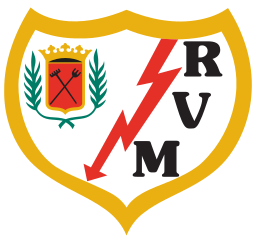
Raúl Martín Presa, majority owner of Rayo Vallecano, stands on the media platform at Estadio de Vallecas with the same expression Rayistas have seen many times before. They have watched him introduce a new manager six or seven times since he “saved” the club from the villainous Ruiz-Mateos family back in 2011. The club was bankrupt then, on its knees and the victim of horrendous mismanagement by a greedy fraud for almost twenty years.
Unfortunately for the small, poor community on the outskirts of Madrid, and in the opinion of El Rayo’s fans, if Ruiz-Mateos was the hunter, Presa was the scavenger; there to pick the bones clean for the last nine years.
Viewed through the eyes of an avid Rayo follower, Presa’s expression is one of glee. A sinister look, where he cannot hide his pompous confidence that his latest plan will further line his pockets, against the strongly opposing will of Rayo’s passionate, heavily left-leaning, community-oriented fanbase. The relationship here can be best compared to if Mike Ashley chose to give Newcastle fans a lecture on why Michael Owen is actually a lovely guy, while burning a photograph of Nobby Solano.
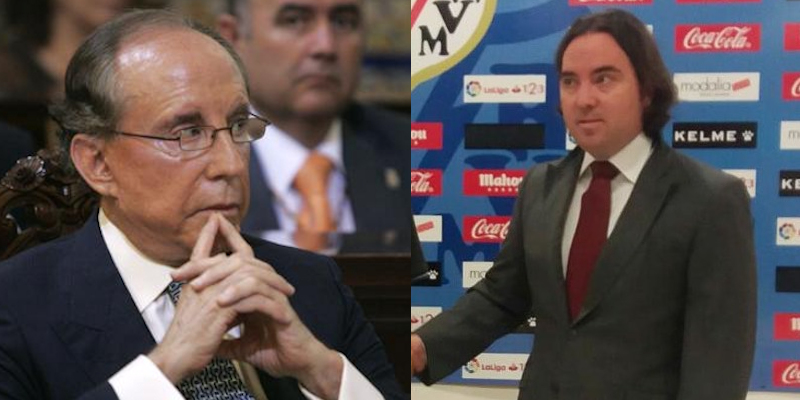
Rayo Vallecano are widely considered to be the last of the barrio teams. Vallecas is a neighbourhood on the outskirts of Madrid with a population of around 300,000. The heavily socialist area can be summed up by a banner regularly unfurled at matches by the Bukaneros which reads “somos pobres con orgullo” or “we are poor but proud.” The Bukaneros are Rayo’s often vilified ultra left wing supporter’s group. They are emblematic of the socialist cause in this oft-forgotten region near Spain’s capital.
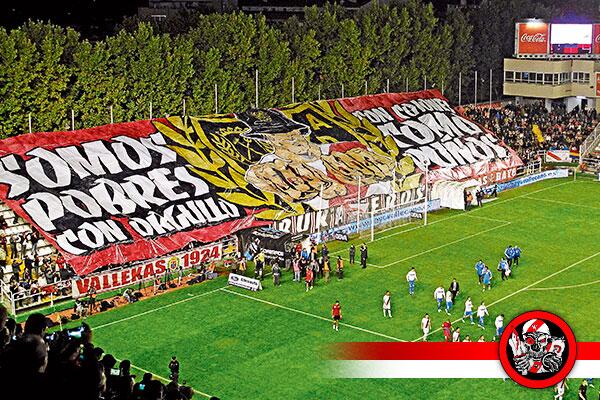
The Bukaneros maintain that their perpetual pursuit of justice and protest against the establishment is both peaceful and necessary, despite media coverage and outsider opinion often suggesting otherwise.
Their most famous exploits include banding together with the Rayo players in 2014 to raise enough money to cover the unjust debts of one of their own residents in Vallecas, 85-year old Carmen Martínez Ayuso, meaning she was saved from homelessness. Notable also was the absolute moral rejection to the signing of Roman Zozulya in 2017. The Ukrainian striker had many well-documented links to the far-right, and with the club existing to coalesce the anti-fascist, anti-racist and anti-homophobic sentiments of their passionate local fanbase, the Bukaneros could not and would not accept the presence of someone inside their beloved club with alleged ties to the opposite ideology. Zozulya never donned ‘la franja’ and left Vallecas soon after.
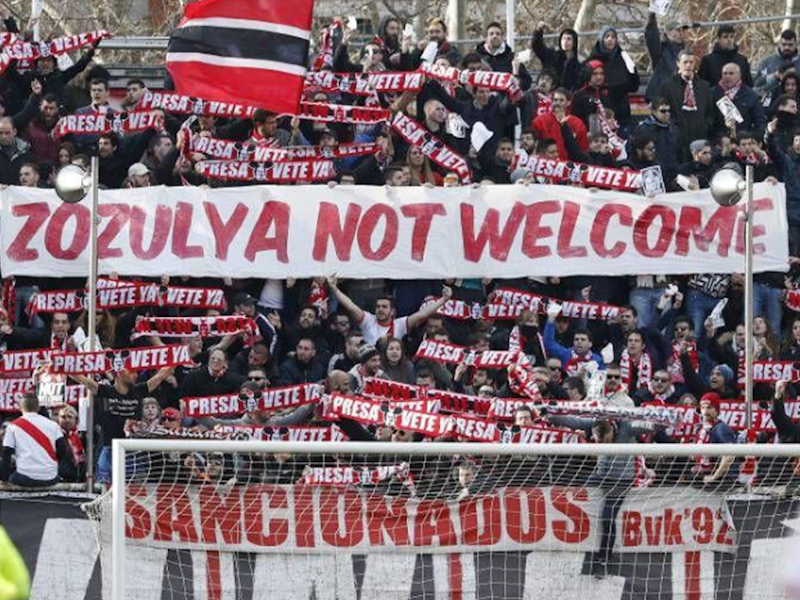
The reason Presa looks so smug standing in front of the assembled Spanish journalists is that today he is putting a new man in the Rayo Vallecano hotseat. Andoni Iraola’s spell was short but unsuccessful, which is typical of the Presa era. The Iraola project was always destined to be a struggle, as he followed in the footsteps of Paco Jémez in his second spell. Jémez was often a divisive and confrontational figure, but ever since delivering Rayo’s best ever league finish, 8th in La Liga in 2013, coupled with his extreme attention to detail and commitment to his ‘juego de posición’ philosophy, he has a special place in El Rayo’s history.
The dissonant chatting voices in the room stop and the camera flashes spark into life as the door creaks open and in walks Rayo Vallecano’s new manager.
It is 45-year old Peruvian Fernando Teixidó.
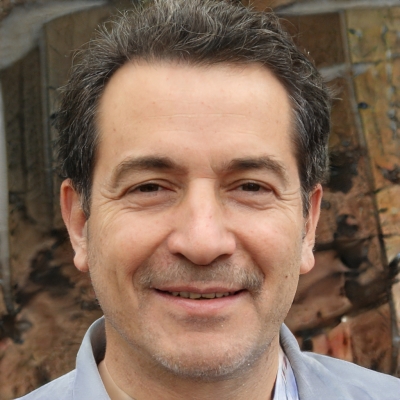
The ex-Club The Strongest manager cut his teeth winning back-to-back league and cup doubles in the high altitude of Bolivia in the only managerial role of his career so far. The Peruvian was said to desire a move to Spain to live closer to his elderly father, Carlos Alberto Teixidó, who still resides in Catalonia.
The confusion on the faces of the journalists is only marginally less noticeable than the representatives of the Bukaneros in attendance, who are eagerly waiting to resist and revolt at a moment’s notice. In keeping with their signature open mindedness, however, they shush the room in order to allow their new manager to speak.
Teixidó shakes Presa’s hand, smiling warmly, before clearing his throat and turning to the congregated press and fan representatives.

“I am honoured to be taking this role, as manager of Rayo Vallecano. Not many of you may know me, but I am thankful to Mr Presa for giving me this opportunity.”
The very mention of the club president’s name in this cookie cutter opening statement strikes an immediate discord with those in attendance. The owner licks his lips nervously, shifting his weight from foot to foot. Teixidó pauses, briefly looking down at his shoes. This isn’t a great start.
“The important things about this club are our community and our stability. We must pursue realistic and obtainable goals with a careful approach. We are in the shadow of our Madrid rivals. We are in the shadow of our many rivals in this division, let alone the riches of La Liga.”
This sounds like a concession of defeat from the beginning.
Under promise, over deliver? No. It sounded more like dangerous pessimism signalling further disaster at this sinking ship of an organisation, just with a different captain at the helm.
This is awkward.
Fernando Teixidó looks down at his notes in silence for a good ten seconds, before pushing the pages aside, puffing out his chest, standing tall and making eye contact with those football journalists in the front row.
Presa looks worried, like he could sense the atmosphere in the room was about to change.

In a development only comparable to Jordan Belfort’s “I’m not fucking leaving!” scene in The Wolf of Wall Street, the Peruvian shifts his tone.
“Too long this club has been an ‘equipo ascensor’ (yo-yo club).”
“Too long it has been shackled by the men in suits.”
Teixidó has burst into life.
“The spirit of the Matagigantes has been forgotten in Vallecas, and through the three pillars of humility, integrity and nobility, we will rise again!”
If Raúl Martin Presa looked worried before, now he was positively terrified.
The atmosphere in the room is electric. Like rayo had struck the building mid-sentence.
“No, no, no pasaran!” chants start booming from the back of the room, as the Bukaneros chant“they will not pass,” a powerful message originally aimed at Franco’s dictatorship, but now firmly pointed at the capitalist powers at the top of their club.
The Teixidó era at Rayo Vallecano has begun.
Could the Ancelotti-worshipping Dylanista replicate the success he had in South America here in Spain?
Would Presa let him? This is a battle of wills, and it is just getting started.
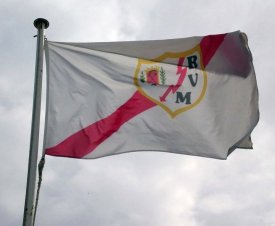
Welcome to Madrid!
I will continue my plan of splitting posts into 50% narrative, 50% ‘save update’ or informal writing of my thoughts, strategy and results. The approach worked last year, and hopefully it makes for a good read again.
I was inspired to manage Madrid’s third club after reading the incredible book Working Class Heroes by Robbie Dunne. I wholeheartedly recommend giving it a read, even if you have no previous interest or connection to El Rayo.
The combination of a passionate community-driven anti-fascist club in the face of the money-driven capitalist giant of modern football was too tempting to ignore.
Throw in a manager with a dogmatic tactical approach, willing and able to fearlessly express his opinions, and it makes for an interesting dichotomy that I hope translates well into this written FM series.
If you are new to my blog, and Fernando Teixidó is a stranger to you, he is my fictional manager who first appeared managing Club The Strongest last year in FM20. That series is linked here, and while you may not wish to read all seven posts of that short series (I hope that you do though), I’d advise looking at the first post, which outlines just who Teixidó is, a formerly aggressive anchoring midfielder with a strong interest and reliance on statistics.
In the next post, we’ll take a look at Rayo Vallecano as a whole. From the finances and facilities (spoiler alert – Rayo are often considered a ‘beg and borrow’ club, nevermind a ‘selling’ one) to the playing squad and Teixidó’s initial setup at training and in pre-season. I’ll also go over some of the ‘rules’ of the save, like allowing the board to handle contract negotiations, and therefore mandatory release clauses and the purchasing negotiation process of player acquisition.
Hopefully Teixidó can stick around in Vallecas for a number of years and we can see him build his iteration of Rayo Vallecano into something memorable. Fingers crossed his confrontational approach to the club’s hierarchy, and the results his team delivers, don’t make him a well-liked martyr, an idealist cast aside in the cut-throat reality of modern football.
Thanks for reading.
FM Stag


